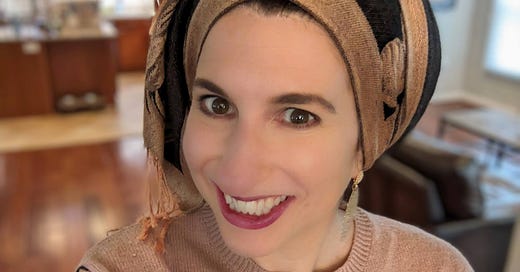If I’m being completely honest… I think I launched Jewish Women Talk About Romance Books out of frustration.
I was tired of going into Jewish spaces and feeling like I needed to both explain, and defend, the existence of Jewish romance. I was drained by the way Jewish romance authors were admonished in reading communities, called fluff, described as the palate cleanser one enjoys between the “real” Jewish books, not so brilliant. And frankly, I was angry.
I was irritated at those who held onto their old-world ideas, who saw themselves as champions of liberalism and feminism, but couldn’t see their own misogyny or internalized antisemitism in a review or a comment. I wish that people could see that uplifting stories that denigrated Jewish life… was, in fact, extremely bad for Jews.
This week’s Torah portion, Devarim, brings us to opening chapter of Deuteronomy. Yet, the fifth and final book of our Hebrew Bible is not so much another chapter in the Israelite story, but rather, a repetition. The name of the portion, Devarim, means “the words.” Moses is aware that he is dying, and he gathers all of Israel together, in order to deliver a final speech—most of which is a repetition of the story we have just read.
What’s interesting about this portion, however, is that the word devarim in Hebrew has a connotation of rebuke attached. In fact, the opening phrase of this portion only appears five times in our Torah, showing a level of significance. And so, our sages ask the question, “Why open with this phrase? Why use the Hebrew phase, "these are the words," which has a connotation of admonishment?”
Our sages have a lot of theories. Rashi believes that Moses is remembering all the places where the Israelites have angered God. Some also point out that Moses is dying, and so, there is an issue of urgency in making sure that the Israelites remember the commandments and their people’s story. And, some commentators remind us that rebuke, or tochecha, is part of our Jewish tradition, a way we as individuals and a community move towards better. And then, Moses says something that struck me as rather poignant. He says, “I cannot bear the burden of you myself.”
What does Moses really want in this scene?
He wants his community to show up.
When I stared Jewish Women Talk About Romance Books, it was out of frustration. But I knew there was an audience for these books. I knew that we had plenty of Jewish and non-Jewish readers who loved and adored our stories, who saw their depth and themes, who cried upon seeing the Jewish representation in a book which uplifted Jewish life. In fact, I know many people who would tell you, flat out, that a Jewish romance saved their life.
And after October 7th, when our small group was suddenly flooded with new members who no longer felt safe in their own bookish communities, who needed a space to celebrate and feel pride in their own Judaism, I got to work again. I created the Jewish Joy Book Club.
And when Jewish authors began to be blacklisted, their names on do-not-buy Zionist lists, kicked out of cons for their views on Israel—I created more spaces for promotion, author takeovers, The Jewish Joy Box. And this week, I laid down the foundation for creating a Jewish Joy Con in 2026.
But none of us can build a thing alone.
I’m grateful to my Jewish joy family. Those of you who show up. Those of you have bought my books, ordered The Jewish Joy Box, joined our group and participated in chats. Those of you who have sent me messages, asked me to speak at your Jewish community centers and synagogues, given me the opportunity to write articles, put me in boxes. I’m grateful for the nice reviews from trade pubs, and the bookstores that welcome me, and my beloved libraries.
And I’m grateful to all those bookstagrammers and reviewers who have rallied in support of me after unfair attacks. Bookstagrammers who have often faced their own backlash, or loss of followers, in order to do what was right.
And, I’m grateful to other authors in the Jewish community, women like Alison Hammer of who have shown up to take on projects just as big and important. And I'm grateful all the Jewish orgs that have attempted to rally and form a response to all the awful antisemitic thing that has been happening within publishing since October 7th.
And while I am done at this stage of my life, and career, explaining things to people who will never get it… I am grateful for all of you who fight beside me. Who understand the importance of happy endings in Jewish stories. Who work hard to break open wide the doors to culture change, making a stronger and more robust Jewish community in the process. Because you know that fighting for Jewish romance, and Jewish Joy, is the same exact thing as fighting for Jews.
Because there is no us, without you.
Shabbat Shalom.
Discussion about this post
No posts




